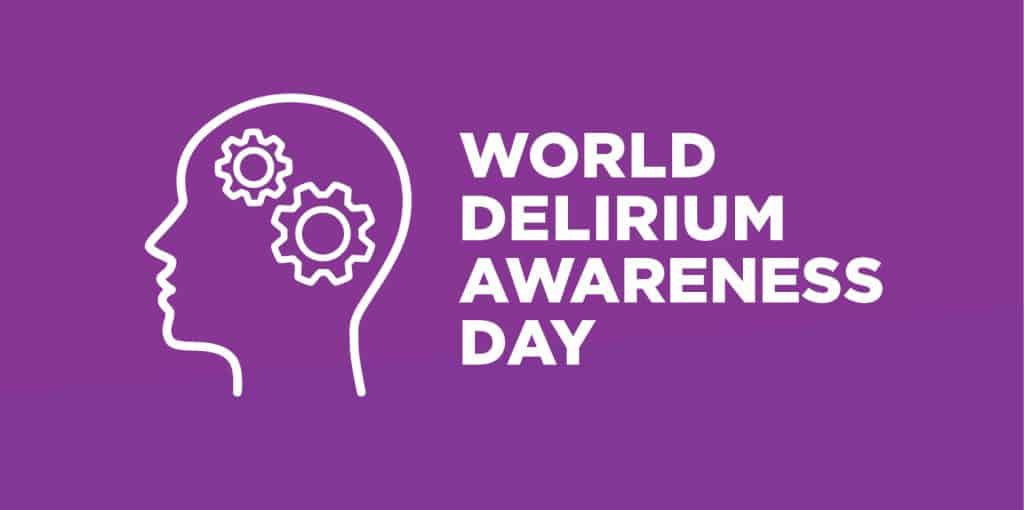World Delirium Awareness Day is March 11, but what exactly is delirium?

Delirium is a rapid change in brain function that affects the ability to focus attention. Often confused with dementia, delirium can fluctuate over the course of a day with periods of clarity followed by increased confusion. It is caused by many issues that patients can experience while hospitalized. Those most at risk for developing delirium are:
- Critically ill patients (in the ICU)
- Older adults greater than 70 years of age
- Patients post-surgery
- Those with previous cognitive impairment/dementia, multiple medical conditions, sensory impairment, or immobility while hospitalized
However, more than 60% of patients with delirium are not recognized by health care systems. Hypoactive delirium (appearing to be sedated) is difficult to diagnose, and more consistently care providers think a patient is just sleepy or depressed. Hyperactive delirium (appearing aggressive or restless) is more recognizable but can be misdiagnosed as dementia. But how can delirium be prevented? Read on to learn more about this often misunderstood condition as part of World Delirium Awareness Day.
Did you know?
- Up to 80% of patients who are mechanically ventilated (connected to a machine to aid in breathing) develop delirium.
- Up to 67% of patients with dementia present with or develop delirium.
- In Minnesota, 24% of serious injury/death adverse health event falls in 2016-17 were related to dementia/delirium.
- Hospital-acquired delirium is preventable in 30-40% of cases.
Early recognition is key in minimizing the harmful effects of delirium
Delirium is known as a critical-illness-acquired brain injury because of the risk of long-lasting cognitive effects that impair function after leaving the hospital. Patients with delirium have a nearly 5-day longer hospital stay than patients without delirium, as well as an increased risk of readmission. Delirium can also result in PTSD or the need for transitional care.
The best approach when entering a hospital is to recognize if you or a loved one is at risk of delirium and communicate this to your care team. Early recognition by doctors, nurses, and therapists can help decrease a patient’s risk of developing delirium in the hospital. There are interventions (such as early mobility and medication management) that can help prevent or lessen the severity or length of a delirium episode.
What is Hennepin Healthcare doing to combat delirium?
At Hennepin Healthcare, a Delirium task force was created in October of last year to better identify and treat delirium in our patients, decrease hospital length of stay, and provide education on delirium prevention. Patients are regularly screened for delirium and, when tested positive, staff may initiate interventions such as:
- Promoting good sleep and a day/night cycle
- Promoting early mobility—the single best intervention to prevent and treat delirium
- Cognitive stimulation—frequent and daily patient orientation
- Reducing any medical lines and restraints as soon as able
Just as with any other health condition, you should let your healthcare team or doctor know if you or your loved one is at risk of developing delirium when they enter the hospital. With many older adults living in an assisted living facility or nursing home, a change in cognition or alertness (ie delirium) can be the first sign that a patient is sick.
You play an important role in your loved one’s care
You and your family can play an important role when your loved one is hospitalized and at risk of developing delirium. Family members should make sure the patient has glasses, dentures, hearing aids, or other familiar items from home. Also, family can help keep the patient awake during the day and talk with them to stimulate and re-orient them to their surroundings. Delirium management really takes a team effort, including the family, to help minimize risk and prevent the long-term consequences of hospital-acquired delirium.
Learn more at deliriumsociety.org or icudelirium.org. Be sure to use the hashtags #WDAD2020 and #bedrestisbad to spread the word about delirium on social media.

